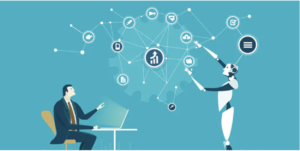
Over the past decade, AI has expanded at an exponential rate. The way business is done has been completely transformed as a result. There has been a recent upsurge in creativity, and with it comes the rise of ‘smart’ automatic systems and other forms of artificial intelligence.
Artificial intelligence, in its most basic definition, refers to any technology that uses algorithmic processing to turn massive volumes of data into useful and actionable knowledge.
While some are skeptical of the change that it brings, recent data shows a different picture.
Because of the high hopes placed in AI by businesses and industries, investments in the field are expected to more than double from $8 billion to $47 billion around 2022’s, says Betterworks.
Oracle did research into this aspect and found that most HR professionals are excited about adding AI to their HR processes. In fact, a study conducted recently in 2019 by Oracle and Future Workplace found that 64% of them would rather get advice from an AI than from their manager.
The researchers also discovered that:
~ 50% of workers now use some kind of AI at work, up from just 32% in 2018.
~ Most workers (65%) are happy, excited, and thankful to have robot co-workers, and almost a quarter say they have a loving and rewarding connection with AI at work.
~ India (60%) and China (56%), accompanied by the UAE (44%), Singapore (41%), Brazil (32%), Australia and New Zealand (Combined) (26%), Japan (25%), the US (22%), the UK (20%), and France (8%), have the most excited workers about AI.

Here Are 5 Ways In Which AI Is Reinventing HR!
Sourcing Candidates
Human resource platforms that use AI to find the finest market talent dominate the market. Recruitment officers must examine vast amounts of data to consistently discover the top recruits. AI in HR also helps find weak places in the business that would benefit from the new workforce and match the appropriate talent with the right position in the right organization.
Resume Screening
Resume screening is not a difficult but a time-consuming and tiresome procedure. All resume screening requires is a list of conditions every candidate must meet and fulfill. It is here where AI can replace humans. Simply feed data into an AI platform and watch it work. AI technologies can search internal databases for former candidates who may fit fresh job vacancies.
Bias-Reduction
Many recruiters aim to be inclusive, but they’re human and maybe subconsciously influenced by variables unrelated to job competency. As humans, recruiters prefer similar prospects. Ethnicity, language, gender, and race can alter recruiter perception. Unconscious prejudice affects resume selection and job descriptions.
Automation and AI are utilized to minimize prejudices by using algorithm evaluation platforms that take these biases into account to ensure a diversified pool of candidates. An algorithm evaluation platform can be reprogrammed to remove bias after an audit.
Simplifies Onboarding
After hiring, AI tools can improve onboarding and training. New employees require a lot of HR’s attention, but much of it may be minimized by utilizing AI to introduce them to various parts and walk them through everyday tasks. AI algorithms reduce the need for humans in the onboarding and training of new personnel, which might take days or weeks depending on availability.
Employee Management
AI helps HR teams with staff training and appraisal. AI systems can identify skill shortages and build training programmes for staff. Many firms still use e-learning tools for continual training, but they’re often disorganized and ineffective. AI tools structure and present programmes for more targeted learning. AI has changed staff analytics. They’re similar to on-call assessments and vital to a business.
Administrative Automation
Repetitive administrative work can be very time-consuming. Multiple correspondences, email follow-ups, document submissions, payroll management, compliance management, and performance review data can be tedious.
AI can handle most of these repetitious administrative jobs. It can take care of administrative activities including task assignment and labour coordination. Payroll management and compliances are better handled by AI. Thereby, enabling the HR team to focus on the core business.
Okay! But What Is The Final Verdict?
AI is redefining many sectors of business, including HR, which HR teams can’t ignore. AI-based HR solutions can boost employee productivity and make HR better.
AI systems save time for HR and other personnel. With administrative activities automated, HR professionals can focus on decision-making, personnel development, and strategic management. AI simplifies recruitment, onboarding, training, staff analytics, and many other tasks. Having said that, one should understand that the emotional quotient which humans bring is irreplaceable and cannot be replaced by AI. One should look at AI as more of an enabler than a replacement of humans.







Recent Comments